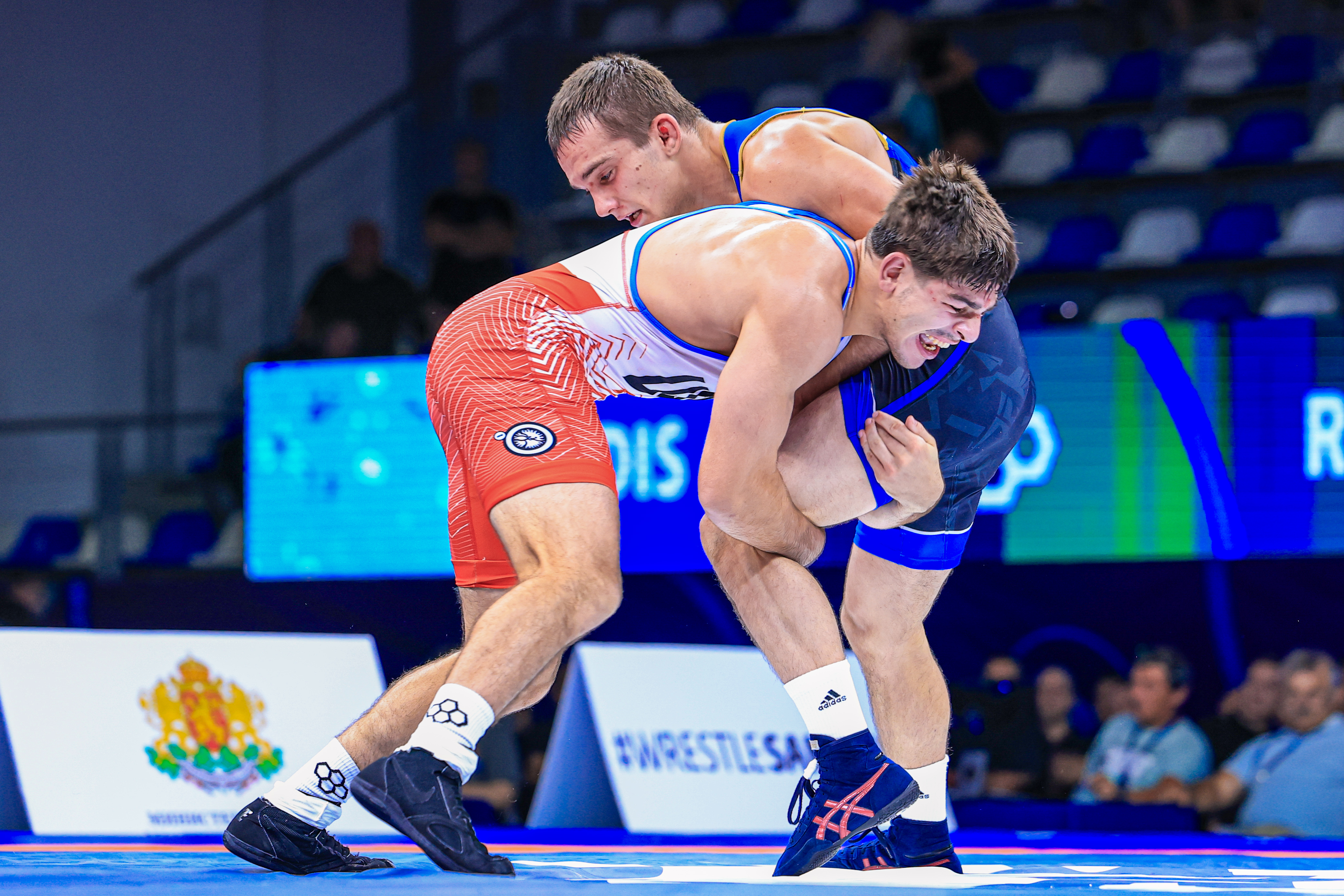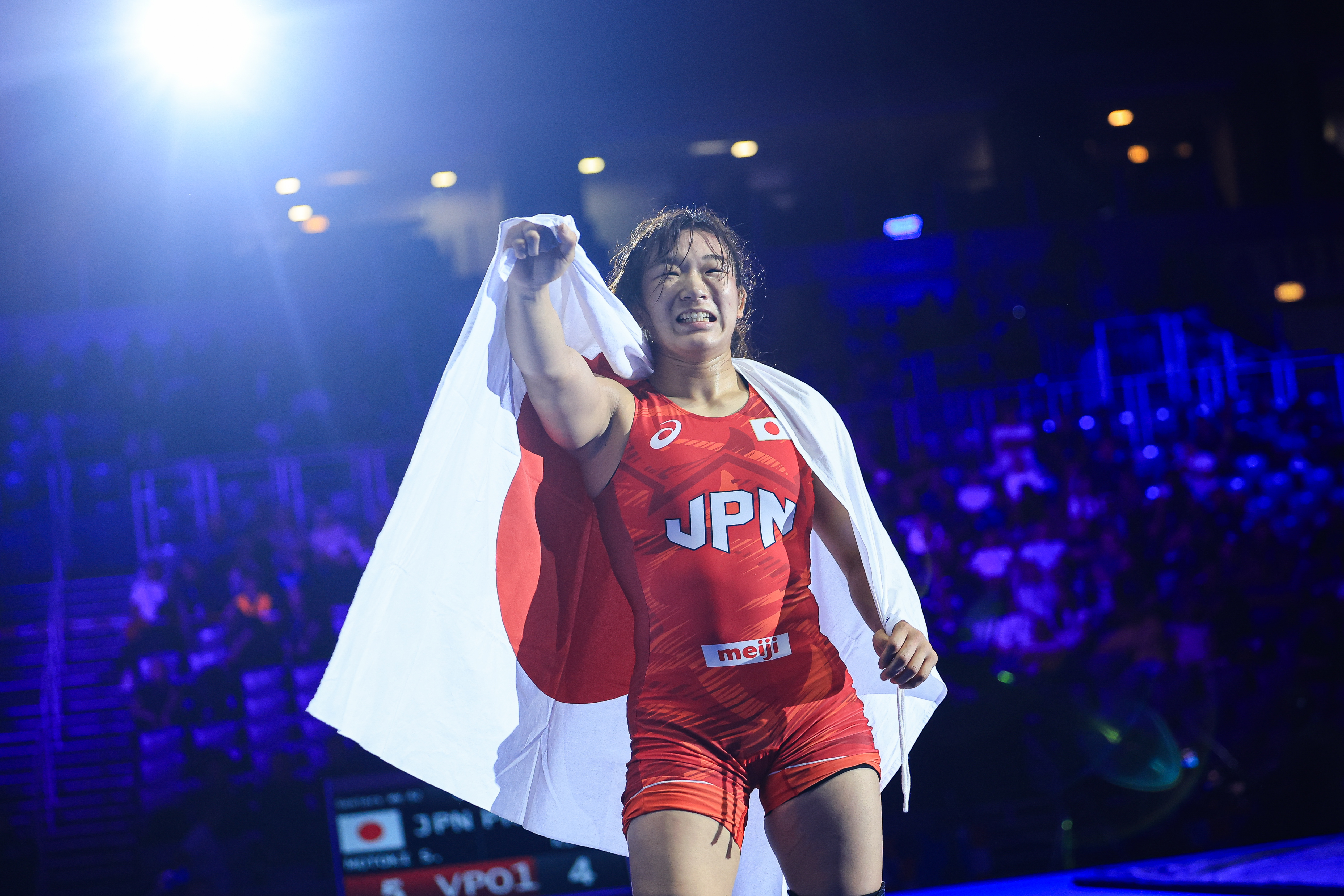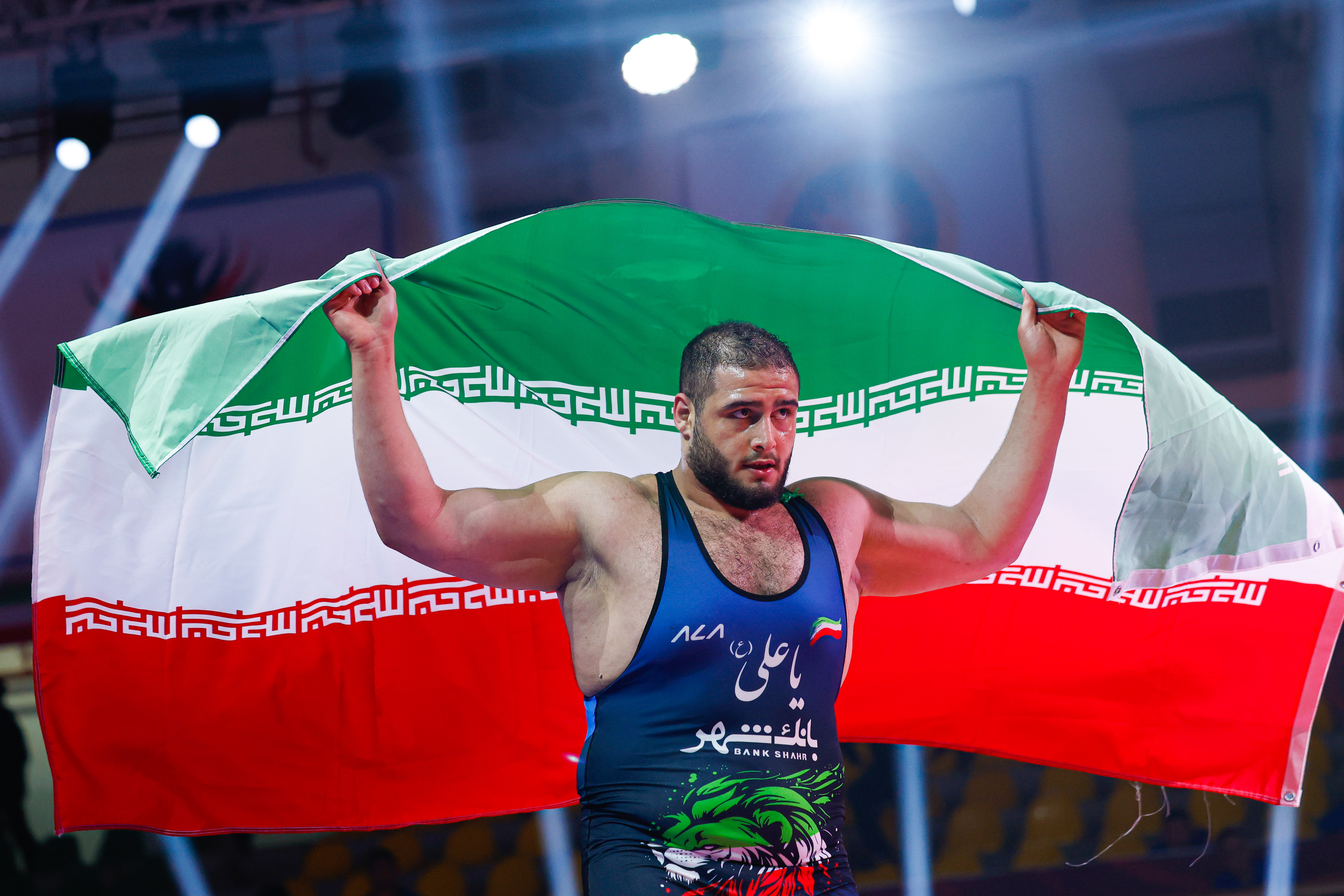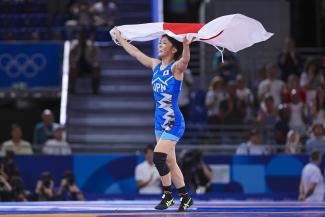NOVI SAD, Serbia (October 3) -- Around 700 wrestlers will descend upon Novi Sad, Serbia for the final World Championships of the year.
The U23 World Championships will be held in Novi Sad from October 20 to 27 at the SPENS, with Greco-Roman kicking off things followed by Women's Wrestling and Freestyle.
The U23 World Championships will be live on UWW+ on the UWW website and the UWW App.
Note: These are early entries and subject to change.
 PJ DUKE (USA), red, is won the 70kg gold medal at the U20 World Championships in August. (Photo: Amirreza Aliasgari)
PJ DUKE (USA), red, is won the 70kg gold medal at the U20 World Championships in August. (Photo: Amirreza Aliasgari)
Freestyle
57kg
Norik HARUTYUNYAN (ARM)
Muhammadali ALIZADA (AZE)
Ivaylo TISOV (BUL)
Honghang LIAO (CHN)
Luka GVINJILIA (GEO)
Karamjeet HOLSTEIN (GER)
Sumit MALIK (IND)
Milad VALIZADEH (IRI)
Simone PIRODDU (ITA)
Yuta KIKUCHI (JPN)
Zhakhongir AKHMAJANOV (KAZ)
Mukhammadrasul SALIEV (KGZ)
Ion BULGARU (MDA)
Maruf KARGBO (SLE)
Bekir KESER (TUR)
Vladyslav ABRAMOV (UKR)
Luke LILLEDAHL (USA)
Matsvei SYTSEVICH (UWW)
Aiandai ONDAR (UWW)
Nodirbek JUMANAZAROV (UZB)
61kg
Endrio AVDYLI (ALB)
Levik MIKAYELYAN (ARM)
Jeyhun ALLAHVERDIYEV (AZE)
Roger DOS SANTOS (BRA)
Erdal GALIP (BUL)
Blayne HELOU (CAN)
Yongquan LUO (CHN)
Nika ZANGALADZE (GEO)
Dario DITTRICH (GER)
SHUBHAM (IND)
Reza MOMENI (IRI)
Akito MUKAIDA (JPN)
Merey BAZARBAYEV (KAZ)
Omurbek ASAN UULU (KGZ)
Vasile MARCU (MDA)
Besir ALILI (MKD)
Amir HAMAYUN (TKM)
Tolga OZBEK (TUR)
Mykyta ABRAMOV (UKR)
Jaxen FORREST (USA)
Fedor BALTUEV (UWW)
Mikita BERAZUN (UWW)
Behruzbey TURANMURATOV (UZB)
65kg
Andranik AVETISYAN (ARM)
Aykhan ABDULLAZADA (AZE)
Ayub MUSAEV (BEL)
Denis NAIM (BUL)
Ryan DAHCHA (CAN)
La ZHANG (CHN)
Said ELGAHSH (EGY)
Khamzat ARSAMERZOUEV (FRA)
Nikoloz BESHIDZE (GEO)
Zoltan MIZSEI (HUN)
SUJEET (IND)
Yasin REZAEI (IRI)
Mattia BIENTINESI (ITA)
Yuto NISHIUCHI (JPN)
Rustem TOLEN (KAZ)
Bilol SHARIP UULU (KGZ)
Fiodor CEAVDARI (MDA)
Diego PERAZA AGUILAR (MEX)
Dominik JAGUSZ (POL)
Daniel SANDU (ROU)
Abdullah TOPRAK (TUR)
Mykyta HONCHAROV (UKR)
Marcus BLAZE (USA)
Anatoli HRAMYKA (UWW)
Bashir MAGOMEDOV (UWW)
Umidjon JALOLOV (UZB)
Victor PARRA ROMAN (VEN)
70kg
Davit MARGARYAN (ARM)
Alexander SEIWALD (AUT)
Kanan HEYBATOV (AZE)
Muhammad ABDURACHMANOV (BEL)
Kaloyan ATANASOV (BUL)
Cole COGHILL (CAN)
Matias MUNOZ RAMIREZ (CHI)
Tao WEI (CHN)
Orislandy PERDOMO BROOKS (CUB)
Yehia HAFEZ (EGY)
Denis KODAKOV GIL (ESP)
Davit PATSINASHVILI (GEO)
Rostislav LEICHT (GER)
Naveen KUMAR (IND)
Sina KHALILI (IRI)
Kaito MORITA (JPN)
Maiis ALIYEV (KAZ)
Adis RAKHAT UULU (KGZ)
Alexandr GAIDARLI (MDA)
Gabriel SANCHEZ ZEPEDA (MEX)
Umut ERDOGAN (TUR)
Narek POHOSIAN (UKR)
PJ DUKE (USA)
Mikita DZEMCHANKA (UWW)
Umar UMAROV (UWW)
Begijon KULDASHEV (UZB)
74kg
Fabian KOCILERI (ALB)
Grigor CHOLAKYAN (ARM)
Magomed KHANIEV (AZE)
Magomedrasul ASLUEV (BRN)
Petar PETKOV (BUL)
Sehajpal SIDHU (CAN)
Tao SHEN (CHN)
Omar MOURAD (EGY)
Seyfulla ITAEV (FRA)
Giorgi GOGRITCHIANI (GEO)
Manuel WAGIN (GER)
Georgios IOAKEIMIDIS (GRE)
PARVINDER (IND)
Mohammad BAKHSHI (IRI)
Luca FINIZIO (ITA)
Yoshinosuke AOYAGI (JPN)
Dias SAGDATOV (KAZ)
Baitemir TULEBERDIEV (KGZ)
Ion MARCU (MDA)
Alonzo SMILEY GARCIA (MEX)
Zelimkhan MUTSUKHAEV (POL)
Mohamed KASSEGBAMA (SLE)
Muhammed OZMUS (TUR)
Mykyta MORHUN (UKR)
Mitchell MESENBRINK (USA)
Aliaksandr VIARBITSKI (UWW)
Magomed BAITUKAEV (UWW)
Jafar CHULIBOYEV (UZB)
79kg
Hayk PAPIKYAN (ARM)
Farid JABBAROV (AZE)
Aykan SEID (BUL)
Connor CHURCH (CAN)
Bolati NA ERTAI (CHN)
Geannis GARZON TAMAYO (CUB)
Luka CHKHITUNIDZE (GEO)
Gregor EIGENBRODT (GER)
CHANDERMOHAN (IND)
Mahdi YOUSEFI (IRI)
Subaru TAKAHARA (JPN)
Yerkhan ABIL (KAZ)
Ion MARCU (MDA)
Yael PEREZ AKE (MEX)
Mateusz PEDZICKI (POL)
ANDRIJA IVANOVIC (SRB)
Umar MAVLAEV (SUI)
Ibrahim YAPRAK (TUR)
Vitalii MALENKOV (UKR)
Levi HAINES (USA)
Nikita DMITRIJEVS MAYEUSKI (UWW)
Davud DAUDOV (UWW)
86kg
Ibrahim SULA (ALB)
Mushegh MKRTCHYAN (ARM)
Lukas LINS (AUT)
Ali TCOKAEV (AZE)
Radomir STOYANOV (BUL)
Aiden STEVENSON (CAN)
Minghui LIANG (CHN)
Gabriel IGLESIAS RAMOS (ESP)
Miko ELKALA (FIN)
Rakhim MAGAMADOV (FRA)
Tornike SAMKHARADZE (GEO)
Theodoros SINGIRIDIS (GRE)
Zeteny GANGL (HUN)
ASHISH (IND)
Abolfazl RAHMANI (IRI)
Aaron AYZEROV (ISR)
Gabriele NICCOLINI (ITA)
Fumiya IGARASHI (JPN)
Mukhanbet MAMBETOV (KAZ)
Mukhammad ABDULLAEV (KGZ)
Paulius LESCAUSKAS (LTU)
Eugeniu MIHALCEAN (MDA)
Kevin DE LEON (MEX)
Igor SZUCKI (POL)
Soltan BEGENJOV (TKM)
Ahmet YAGAN (TUR)
Denys BYKOV (UKR)
Rocco WELSH (USA)
Arsen BALAIAN (UWW)
92kg
Knyaz IBOYAN (ARM)
Sadig MUSTAFAZADE (AZE)
Magomed SHARIPOV (BRN)
Sali SALIEV (BUL)
Judah ARTHURS (CAN)
Yuanchong YANG (CHN)
Mukhammedsultan KOPBAYEV (ESP)
Andro MARGISHVILI (GEO)
Daniel FISCHER (GER)
Gkivi BLIATZE (GRE)
Krisztian ANGYAL (HUN)
SACHIN (IND)
Mobin AZIMI (IRI)
Daisuke MASUDA (JPN)
Aibek AITBEKOV (KAZ)
Ulukbek SOOROMBEKOV (KGZ)
Ion DEMIAN (MDA)
Demchigdorj TUMURBAATAR (MGL)
Redjep HAJDARI (MKD)
Filip SZUCKI (POL)
David JAKSIK (SVK)
Orazmuhammet HOJALYYEV (TKM)
Alperen TOKGOZ (TUR)
Ivan CHORNOHUZ (UKR)
Joshua BARR (USA)
Mukhamed KHANIEV (UWW)
Sherzod POYONOV (UZB)
97kg
Sergey SARGSYAN (ARM)
Zafar ALIYEV (AZE)
Andriyan VALKANOV (BUL)
Samuel PEREIRA (CAN)
Feilong GAO (CHN)
Aabdelrahman SHEYATAN (EGY)
Aimar ALZON EGUINOA (ESP)
Adlan VISKHANOV (FRA)
Merab SULEIMANISHVILI (GEO)
Nikolaos KARAVANOS (GRE)
Musza ARSUNKAEV (HUN)
VICKY (IND)
Abolfazl BABALOO (IRI)
Nikita GOUBARETS (ISR)
Arash YOSHIDA (JPN)
Rizabek AITMUKHAN (KAZ)
Constantin BUZA (MDA)
Juan ITURRIZA RUIZ (MEX)
Wiktor HASA (POL)
Adam JAKSIK (SVK)
Ibrahim BENEKLI (TUR)
David MCHEDLIDZE (UKR)
Garavous KOUEKABAKILAHO (USA)
Soslan DZHAGAEV (UWW)
Otabek NAZIRBOEV (UZB)
125kg
Khachatur KHACHATRYAN (ARM)
Khetag KARSANOV (AZE)
Georgi IVANOV (BUL)
Jorawar DHINSA (CAN)
Yiwei ZHUANG (CHN)
Mostafa SALAHELDIN (EGY)
Giga SHAVADZE (GEO)
Abolfazl MOHAMMAD NEZHAD (IRI)
Alessandro SCARAMELLA (ITA)
Ryusei FUJITA (JPN)
Bauyrzhan SOVETOV (KAZ)
Dmitrii DUSCOV (MDA)
Nambardagva BATBAYAR (MGL)
Hakan BUYUKCINGIL (TUR)
Volodymyr KOCHANOV (UKR)
Daniel HERRERA (USA)
Pavel DZIATLAU (UWW)
Khabib DAVUDGADZHIEV (UWW)
Namoz ABDURASHIDOV (UZB)
 Sakura MOTOKI (JPN), at 62kg, is aiming to become the third wrestler to win all world and Olympic gold. (Photo: United World Wrestling / Kadir Caliskan)
Sakura MOTOKI (JPN), at 62kg, is aiming to become the third wrestler to win all world and Olympic gold. (Photo: United World Wrestling / Kadir Caliskan)
Women's Wrestling
50kg
Aika BRADY (AUS)
Asmar JANKURTARAN (AZE)
Madison MACKENZIE (CAN)
Jinyue LIANG (CHN)
Greili BENCOSME CARVAJAL (CUB)
Maria CAZALLA TORRES (ESP)
Hanny KUMARI (IND)
Minoriho YONEHARA (JPN)
Laura GANIKYZY (KAZ)
Gabija DILYTE (LTU)
Ana PALACIOS HERNANDEZ (MEX)
Munkhgerel MUNKHBAT (MGL)
Marija SPIRKOVSKA (MKD)
Natalia WALCZAK (POL)
Andela VASILJEVIC (SRB)
Nipuni HEWA PEDIGE (SRI)
Svenja JUNGO (SUI)
Chahrazed AYACHI (TUN)
Songul KAVAK (TUR)
Aida KERYMOVA (UKR)
Audrey JIMENEZ (USA)
Natalia PUDOVA (UWW)
Sviatlana KATENKA (UWW)
Mushtariy TOLIPBEKOVA (UZB)
Nohalis LOYO JIMENEZ (VEN)
53kg
Elnura MAMMADOVA (AZE)
Serena DI BENEDETTO (CAN)
Antonia VALDES ARRIAGADA (CHI)
Suiyi CHEN (CHN)
Carla JAUME SOLER (ESP)
Hansika LAMBA (IND)
Maria FERONE (ITA)
Haruna MORIKAWA (JPN)
Zeinep BAYANOVA (KAZ)
Vestina DANISEVICIUTE (LTU)
Christianah OGUNSANYA (NGR)
Sherriffa DOVER (SLE)
Milana MITROVIC (SRB)
Sila AYKUL (TUR)
Nataliia KLIVCHUTSKA (UKR)
Brianna GONZALEZ (USA)
Viktoryia VOLK (UWW)
Ekaterina KARPUSHKINA (UWW)
Dilshoda MATNAZAROVA (UZB)
Alexa ALVAREZ VALENZUELA (VEN)
55kg
Gultakin SHIRINOVA (AZE)
Sophia BECHARD (CAN)
Tianai SHI (CHN)
Amory ANDRICH (GER)
NISHU (IND)
Moe KIYOOKA (JPN)
Shugyla OMIRBEK (KAZ)
Aruuke KADYRBEK KYZY (KGZ)
Mihaela SAMOIL (MDA)
Josefina RAMIREZ DUARTE (MEX)
Patrycja STRZELCZYK (POL)
Alexandra VOICULESCU (ROU)
Isidora ZIVKOVIC (SRB)
Tuba DEMIR (TUR)
Albina RILLIA (UKR)
Cristelle RODRIGUEZ (USA)
Kira SOLOBCHUK (UWW)
57kg
Nargiz SAMADOVA (AZE)
Mia FRIESEN (CAN)
Yifan TANG (CHN)
Yaynelis SANZ VERDECIA (CUB)
Roza SZENTTAMASI (HUN)
Neha SHARMA (IND)
Akari FUJINAMI (JPN)
Nilufar RAIMOVA (KAZ)
Inna ALIMOVA (LTU)
Bertha ROJAS CHAVEZ (MEX)
Georgiana LIRCA (ROU)
Jana PETROVIC (SRB)
Nethmi PORUTHOTAGE (SRI)
Chahd JELJELI (TUN)
Emine CAKMAK (TUR)
Oleksandra KHOMENETS (UKR)
Cecilia WILLIAMS (USA)
Aryna DZEMCHANKA MARTYNAVA (UWW)
Anastasiia KOZLOVA (UWW)
Ulmeken ESENBAEVA (UZB)
59kg
Hiunai HURBANOVA (AZE)
Viktoria BOYNOVA (BUL)
Olivia LICHTI (CAN)
Limin CHEN (CHN)
Anna MICHALCOVA (CZE)
SARIKA (IND)
Aurora RUSSO (ITA)
Ruka NATAMI (JPN)
Viktoriia KHUSAINOVA (KAZ)
Sezim ZHUMANAZAROVA (KGZ)
Madalina PRISACARI (MDA)
Othelie HOEIE (NOR)
Olha PADOSHYK (POL)
JOVANA RADIVOJEVIC (SRB)
Ebru DAGBASI (TUR)
Yuliia PAKHNIUK (UKR)
Alexis JANIAK (USA)
Uladzislava KUDZIN (UWW)
Ekaterina RADYSHEVA (UWW)
Laylokhon SOBIROVA (UZB)
62kg
Birgul SOLTANOVA (AZE)
Annika FINES (CAN)
Huan YANG (CHN)
Lana NOGIC (CRO)
Iris THIEBAUX (FRA)
Luisa SCHEEL (GER)
Yasmine SOLIMAN (HUN)
SAVITA (IND)
Immacolata DANISE (ITA)
Sakura MOTOKI (JPN)
Tynys DUBEK (KAZ)
Gabriela RUDOI (MDA)
Esther KOLAWOLE (NGR)
Alicja NOWOSAD (POL)
Hannah BANGURA (SLE)
Sara SARIC (SRB)
Kerstin NYGREN (SWE)
Selvi ILYASOGLU (TUR)
Iryna BONDAR (UKR)
Adaugo NWACHUKWU (USA)
Yana TRETSIAK (UWW)
Ekaterina KOSHKINA (UWW)
Nigina SABIROVA (UZB)
Astrid MONTERO CHIRINOS (VEN)
65kg
Ruzanna MAMMADOVA (AZE)
Maria SAWIAK (CAN)
Yuqi RAO (CHN)
Vanja GERSAK PEREZ (GER)
Eniko ELEKES (HUN)
PULKIT (IND)
Bianca CONTRAFATTO (ITA)
Nana IKEHATA (JPN)
Zhangyl BEKEN (KAZ)
Dilnaz SAZANOVA (KGZ)
Davaajargal ALTANSUKH (MGL)
Cara DU PLESSIS (RSA)
Masa PEROVIC (SRB)
Beyza AKKUS (TUR)
Oleksandra RYBAK (UKR)
Isabella MIR (USA)
Kseniya TSIARENIA (UWW)
Elizaveta PETLIAKOVA (UWW)
Mukhayyo NARZILLOEVA (UZB)
68kg
Angelina ELLIS TODDINGTON (CAN)
Chunshu DU (CHN)
Gerda BARTH (GER)
Karolina POK (HUN)
SRISHTI (IND)
Laura GODINO (ITA)
Seia MOCHINAGA (JPN)
Beibit SEIDUALY (KAZ)
Gulnura TASHTANBEKOVA (KGZ)
Debanhi TAPIA GARCIA (MEX)
Karolina DOMASZUK (POL)
Maria PANTIRU (ROU)
Emilija JAKOVLJEVIC (SRB)
Nesrin BAS (TUR)
Manola SKOBELSKA (UKR)
Brooklyn HAYS (USA)
Viktoryia RADZKOVA (UWW)
Alina SHEVCHENKO (UWW)
Gilbery GARCIA FRANCO (VEN)
72kg
Daniela BRASNAROVA (BUL)
Vianne ROULEAU (CAN)
Yuqi LIU (CHN)
Veronika VILK (CRO)
Laura KOEHLER (GER)
Diksha MALIK (IND)
Vincenza AMENDOLA (ITA)
Mahiro YOSHITAKE (JPN)
Shamshiyabanu TASTANBEK (KAZ)
Nurzat NURTAEVA (KGZ)
Michelle OLEA RUIZ (MEX)
Haticenur SARI (TUR)
Iryna ZABLOTSKA (UKR)
Jasmine ROBINSON (USA)
Liliana ROZHINA (UWW)
Sevinchoy POLVONOVA (UZB)
76kg
Vanesa GEORGIEVA (BUL)
Nyla BURGESS (CAN)
Yifei SHEN (CHN)
PRIYA (IND)
Makoto KOMADA (JPN)
Alina YERTOSTIK (KAZ)
Kaiyrkul SHARSHEBAEVA (KGZ)
Edna JIMENEZ VILLALBA (MEX)
Damola OJO (NGR)
Patrycja CUBER (POL)
Elmira YASIN (TUR)
Mariia ZENKINA (UKR)
Kylie WELKER (USA)
Valeriia TRIFONOVA (UWW)
 Fardin HEYDAYATI (IRI) will look to defend his GR 130kg title. (Photo: United World Wrestling / Amirreza Aliasgari)
Fardin HEYDAYATI (IRI) will look to defend his GR 130kg title. (Photo: United World Wrestling / Amirreza Aliasgari)
Greco-Roman
55kg
Andi MUCA (ALB)
Arayik TOPALYAN (ARM)
Elmir ALIYEV (AZE)
Kaloyan IVANOV (BUL)
Baoji WU (CHN)
Giorgi KOCHALIDZE (GEO)
Vishvajit MORE (IND)
Armin SHAMSIPOUR (IRI)
Yehuda YOSEF (ISR)
Taiga ONISHI (JPN)
Yerassyl MAMYRBEKOV (KAZ)
Nurbolot BERDIKULOV (KGZ)
Maxim SARMANOV (MDA)
Isaac MARIN MATA (MEX)
Denis MIHAI (ROU)
Sabolc LOSONC (SRB)
Adem LAMLOUM (TUN)
Servan CINAR (TUR)
Yehor ODNOVOL (UKR)
Kenneth CROSBY (USA)
Alibek AMIROV (UWW)
Khojiakbar KUCHKAROV (UZB)
Dieymer ROSAL AMUNDARAY (VEN)
60kg
Mikel TROPLINI (ALB)
Suren AGHAJANYAN (ARM)
Ilkin GURBANOV (AZE)
Borislav KIRILOV (BUL)
Zhaojian WANG (CHN)
Brian SANTIAGO (DEN)
Dimitri KHACHIDZE (GEO)
Georgios SCARPELLO (GER)
KUNAL (IND)
Sajjad ABBASPOUR (IRI)
Melkamu FETENE (ISR)
Tommaso BOSI (ITA)
Koto GOMI (JPN)
Iskhar KURBAYEV (KAZ)
Kubanych ARINOV (KGZ)
Olivier SKRZYPCZAK (POL)
Alhaji TURAY (SLE)
Roland VARGA (SRB)
Mert ILBARS (TUR)
Bohdan HRYSHYN (UKR)
Maxwell BLACK (USA)
Ilia PANIUTIN (UWW)
Mehroj BAKHRAMOV (UZB)
63kg
Ergi UKU (ALB)
Davit JOTYAN (ARM)
Ziya BABASHOV (AZE)
Kristiyan MILENKOV (BUL)
Xiaoli FAN (CHN)
Robert BOSNJAK (CRO)
Jeremy PERALTA GONZALEZ (ECU)
Adham ELSAYED (EGY)
Romeo BERIDZE (GEO)
Ilias ZAIRAKIS (GRE)
GAURAV (IND)
Javad ABOUTALEBI NAVID (IRI)
Miruto TOKUHIGA (JPN)
Nurdaulet KAPAS (KAZ)
Kuttubek ABDURAZAKOV (KGZ)
Vitalie ERIOMENCO (MDA)
Angel SEGURA TELLEZ (MEX)
Ilias LAAOUINA (NED)
Andrej VELISAVLJEV (SRB)
Algot GAMELIUS (SWE)
Servet ANGI (TUR)
Vadym MATROS (UKR)
Kaden ERCANBRACK (USA)
Dordzhi SHUNGURTSIKOV (UWW)
Khusniddin OLIMBOEV (UZB)
67kg
Ardit ZENELI (ALB)
Ruben MIRANYAN (ARM)
Faraim MUSTAFAYEV (AZE)
Dimitar GEORGIEV (BUL)
Nestor ALMANZA TRUYOL (CHI)
Hanqing YONG (CHN)
Yonat VELIZ MARTINEZ (CUB)
William REENBERG (DEN)
Hassan ABDELREHIM (EGY)
Nestori MANNILA (FIN)
Yanis GUENDEZ NIFRI (FRA)
Anri KHOZREVANIDZE (GEO)
Attila JOZSA (HUN)
NISHANT (IND)
Ahmadreza MOHSEN NEZHAD (IRI)
Shon NADORGIN (ISR)
Andrea SETTI (ITA)
Chiezo MARUYAMA (JPN)
Bagdat SABAZ (KAZ)
Baiaman KARIMOV (KGZ)
Adomas GRIGALIUNAS (LTU)
Alexandr GURALI (MDA)
Brandon ALVAREZ MATA (MEX)
Arslanbek SALIMOV (POL)
Adrian ANTON (ROU)
Dejan BERKEC (SRB)
Oussama NASR (TUN)
Azat SARIYAR (TUR)
Imed KHUDZHADZE (UKR)
Otto BLACK (USA)
Hleb MAKARANKA (UWW)
Daniial AGAEV (UWW)
Oybek SHARIBJONOV (UZB)
72kg
Xhorxh FRROKAJ (ALB)
Gaspar TERTERYAN (ARM)
Ruslan NURULLAYEV (AZE)
Sergey STOEV (BUL)
Waili HAIBIER (CHN)
Jakub SIMCIK (CZE)
Artur JEREMEJEV (EST)
Nika BROLADZE (GEO)
Mate VEGH (HUN)
ANIL (IND)
Iman MOHAMMADI (IRI)
Hajime KIKUTA (JPN)
Merey MAULITKANOV (KAZ)
Yryskeldi KHAMZAEV (KGZ)
Vasile ZABICA (MDA)
Jorge GOMEZ GARCIA (MEX)
Piotr STOLARCZYK (POL)
Leonard IURASCU (ROU)
Mihajlo ALEMPIJEVIC (SRB)
Simon BORKENHAGEN (SWE)
Eren ULKU (TUR)
Oleh KHALILOV (UKR)
Aliaksandr KIKINIOU (USA)
Viachaslau ZHEHALAU (UWW)
Danil GRIGOREV (UWW)
Abror ATABAEV (UZB)
77kg
Klodjan SHEHU (ALB)
Samvel TERTERYAN (ARM)
Davud MAMMADOV (AZE)
Azis ATANASOV (BUL)
Chunyang PAN (CHN)
Michal ZELENKA (CZE)
Rasmus ULRIKSEN (DEN)
Yehia ABDELKADER (EGY)
Jonni SARKKINEN (FIN)
Temuri ORJONIKIDZE (GEO)
Radu PLACINTA (GER)
Levente LEVAI (HUN)
ANKIT (IND)
Ahoura BOUVEIRI PIANI (IRI)
Isami HORIKITA (JPN)
Yeldos KAMELOV (KAZ)
Nurel DUISHONBEKOV (KGZ)
Rokas CEPAUSKAS (LTU)
Alexandru SOLOVEI (MDA)
Benjamin HANSEN (NOR)
Zalan PEK (SRB)
Fritz REBER (SUI)
Edvin BAFF (SWE)
Muslim BARGA (TUR)
Irfan MIRZOIEV (UKR)
Aydin RIX MCELHINNEY (USA)
Illia VALEUSKI (UWW)
Ismail BARAKHOEV (UWW)
Doniyorkhon NAKIBOV (UZB)
82kg
Teo SPIRI (ALB)
Iurik PETROSIAN (ARM)
Elmin ALIYEV (AZE)
Ibrahim TABAEV (BEL)
Martin SHISHEKOV (BUL)
Maimaiti ABUDOUSHALAMU (CHN)
Ivo SVIGLER (CZE)
Mohamed DYAB (EGY)
Ekke LEITHAM (EST)
Data CHKHAIDZE (GEO)
Dominik CZUCZOR (HUN)
PRINCE (IND)
Abolfazl MOHMEDI (IRI)
Reon KAKEGAWA (JPN)
Omar SATAYEV (KAZ)
Bekzat ORUNKUL UULU (KGZ)
Alexandrin GUTU (MDA)
Diego MACIAS TORRES (MEX)
Stanislaw FUSSY (POL)
Antal VAMOS (SRB)
Alperen BERBER (TUR)
Ruslan ABDIIEV (UKR)
Beka MELELASHVILI (USA)
ABDULMASIH (UWW)
Gamzat GADZHIEV (UWW)
Samandar BOBONAZAROV (UZB)
87kg
Ruben GEVORGYAN (ARM)
Lachin VALIYEV (AZE)
Ivaylo IVANOV (BUL)
Xinyu LIU (CHN)
Frederik MATHIESEN (DEN)
Mahmoud IBRAHIM (EGY)
Elias LYYSKI (FIN)
Vladimeri KARCHAIDZE ((FRA)
Achiko BOLKVADZE (GEO)
Deni NAKAEV (GER)
Evangelos BOUKIS (GRE)
Rohit BURA (IND)
Gholamreza FAROKHI (IRI)
Leon RIVALTA (ITA)
Daisei ISOE (JPN)
Maksat SAILAU (KAZ)
Artykbek ALYMBEK UULU (KGZ)
Gabriel LUPASCO (MDA)
Yassine BEN LABED (POL)
Patrik GORDAN (ROU)
Andrija MIHAJLOVIC (SRB)
Samet YALDIRAN (TUR)
Ivan CHMYR (UKR)
Payton JACOBSON (USA)
Zaur SHANGEREEV (UWW)
Murodjon ALIMJANOV (UZB)
Brian RUIZ MARIN (VEN)
97kg
Arshak GEGHAMYAN (ARM)
Ali GULIYEV (AZE)
Mihail MELEHOV (BUL)
Zichen YANG (CHN)
Tomislav BRKAN (CRO)
Richard KARELSON (EST)
Aapo VIITALA (FIN)
Luka GABISONIA (GEO)
Darius KIEFER (GER)
NAMAN (IND)
Hadi SEYDI AVENDI (IRI)
Kyo KITAWAKI (JPN)
Iussuf MATSIYEV (KAZ)
Nurmanbet RAIMALY UULU (KGZ)
Ilia CERNOVOL (MDA)
Dorian TREJO OLGUIN (MEX)
Uros KRSTIN (SRB)
Muhittin HELVACI (TUR)
Yehor YAKUSHENKO (UKR)
Maxwell RAMBERG (USA)
Abubakar KHASLAKHANAU (UWW)
Maksim AVERIN (UWW)
Javokhir SHODIYAROV (UZB)
Juan DIAZ BLANCO (VEN)
130kg
Razmik KURDYAN (ARM)
Aykhan MARDANOV (AZE)
Shuangyu CHEN (CHN)
Artur SARKISJAN (CZE)
Kevin USPENSKI (EST)
Saba CHILASHVILI (GEO)
Grigorios KONTOVOUNISIOS (GRE)
Laszlo DARABOS (HUN)
Joginder RATHEE (IND)
Fardin HEDAYATI (IRI)
Ayumu IWASAWA (JPN)
Jokhar UZAROV (KAZ)
Nurbolot TOKTOGONOV (KGZ)
David MOLNAR (SRB)
Cemal BAKIR (TUR)
Mykhailo VYSHNYVETSKYI (UKR)
Aden ATTAO (USA)
Viachaslau FEDARYNA (UWW)
Aleksandr MELEKHOV (UWW)
Damirkhon RAKHMATOV (UZB)
Luis TALAVERA LUNA (VEN)



 PJ DUKE (USA), red, is won the 70kg gold medal at the U20 World Championships in August. (Photo: Amirreza Aliasgari)
PJ DUKE (USA), red, is won the 70kg gold medal at the U20 World Championships in August. (Photo: Amirreza Aliasgari) Sakura MOTOKI (JPN), at 62kg, is aiming to become the third wrestler to win all world and Olympic gold. (Photo: United World Wrestling / Kadir Caliskan)
Sakura MOTOKI (JPN), at 62kg, is aiming to become the third wrestler to win all world and Olympic gold. (Photo: United World Wrestling / Kadir Caliskan) Fardin HEYDAYATI (IRI) will look to defend his GR 130kg title. (Photo: United World Wrestling / Amirreza Aliasgari)
Fardin HEYDAYATI (IRI) will look to defend his GR 130kg title. (Photo: United World Wrestling / Amirreza Aliasgari)
Share your thoughts.
Comments